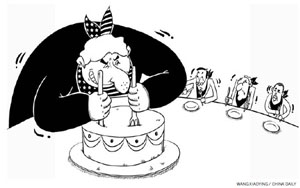Specials
China's debut in credit rating
(chinadaily.com.cn)
Updated: 2010-07-23 11:32
 |
Large Medium Small |
|
 |
|
 |
| What does a rating agency do?
It evaluates a potential borrower's ability to repay debt, by calculating its financial history and current assets and liabilities.
Or simply, it seeks to answer,
"Is your borrower able to pay back?"
|
|
 Editor's Note: Beijing-based Dagong Global Credit Rating Co released its first credit rating report on 50 countries on July 11, slamming its Western counterparts – most notably "the Big Three" monopoly: Moody's, Standard & Poors and Fitch -- for causing the global financial crisis. The move is perceived by many as a major step by China, the world's biggest creditor and third-largest economy, in seeking global financial clout equivalent to its swelling economic might. |
|
 |
Financial regulators had criticized the Big Three agencies for glossing mortgage-linked securities before the US housing market collapsed in 2007. Recently, the Big Three have been rapped for being too slow to downgrade heavily indebted EU economies, most notably Greece and Spain. The problem, in plain words, is that the agencies didn't fully reveal how risky the investments were, until it was too late. Let's hear some ideas from a few influential political and opinion leaders.
 |
At an interview in 1996, Friedman said, "There are two superpowers in the world today in my opinion. There's the United States and there's Moody's Bond Rating Service. The United States can destroy you by dropping bombs, and Moody's can destroy you by downgrading your bonds."
 |
During a Senate debate in May, LeMieux said, "We know that one of the main reasons why we had our financial debacle in 2008 was that credit agencies failed to do their jobs. They put AAA stamps of approval on products that deserve no such stamp."
French President Nicolas Sarkozy and German Chancellor Angela Merkel
 |
 |
Jose Manuel Barroso, EU Commission president
Barroso spoke to media in Brussels on July 2, asking, "Is it normal to have only three" from the same country giving ratings "on such a sensitive issue?"
|
 |
Dagong's credit rating debut seeks to break the monopoly of Moody's, Standard & Poors and Fitch, which not only overrated the mortgage-related investments, leading to the global financial crisis, but also failed to give full credit to China's economic strength, thus increasing China's borrowing costs. Dagong's sovereign credit rating standards, different from the Big Three, include the country's governing ability, economic power, financial ability, fiscal status and foreign reserve.
|
|
Dagong's report is expected to help break the long-established US monopoly over the global credit ratings market, of which China has also been a victim. To reform the West-dominated international financial order, more credit ratings agencies should be set up in non-Western countries to break the monopoly over the global credit ratings business. Dagong's recent report signals China's efforts to participate in making new rules for international ratings and to seek a larger say in this area. As its economic strength grows further, China's credit ratings agency is expected to win a proportionate international status.
The lack of international rating rights has robbed China of the exchange rate of its own currency in the international market. As the largest creditor to the US, China suffered from the US-dominated rating system because it didn't have the necessary ability to protect its financial and fiscal rights.
| 分享按钮 |
